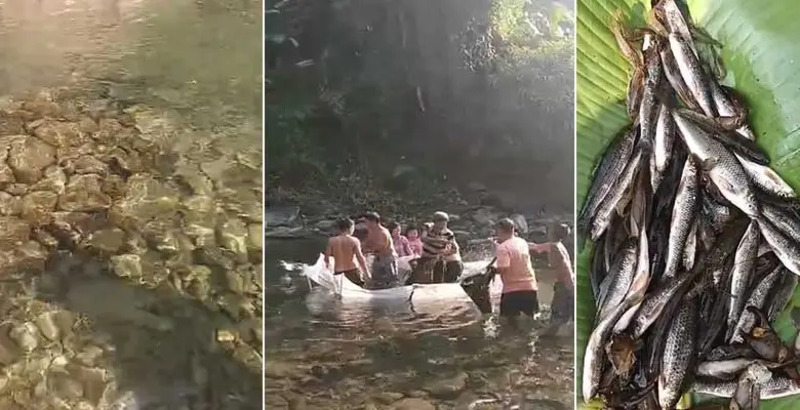 Arunachal Pradesh
Arunachal Pradesh
Fisheries Department launches river ranching initiative to restore aquatic life in Namchucha River
The Fisheries department and district administration of Arunachal Pradesh staarted an initiative called river ranching has been recently introduced to revive the fragile aquatic ecosystem of Namchucha river near Namsang village.
This river serves as a significant tributary of Chatjo river. The move comes as a response to the alarming decline in fish and other aquatic life caused by the rampant use of batteries for electrocution-based fishing methods, reported Arunachal24.
The excessive use of batteries has left the rivers and streams in Tirap district devoid of any thriving aquatic life. To address this pressing issue, it is crucial to raise widespread awareness about the destructive consequences of electrocution.
Engaging local communities, village volunteers, and law enforcement agencies will be instrumental in catching and reporting offenders who persist in using batteries, even during breeding seasons.
Encouraging the adoption of eco-friendly and sustainable traditional fishing practices such as Ngah chaen or Jochaen, Haptang, Longphongtuuk or Longtak is another key recommendation.
The rivers in the region were once teeming with diverse fish species during the 1960s, 70s, and 80s. However, the proliferation of battery usage has drastically diminished or annihilated the fish population.
To combat this issue, it is imperative for community-based organizations (CBOs), NGOs, village elders, Panchayat Members, and student leaders to actively contribute their efforts in dissuading people from resorting to destructive fishing methods. Strict penalties should be enforced for individuals found engaging in such crimes.
Several districts have already implemented fishing bans and exclusively rely on traditional fishing methods.
Furthermore, fishing during breeding seasons must be strictly prohibited. A comprehensive approach is needed to safeguard our rivers, considering the fact that they are rain-fed as opposed to being snow-fed like the Kameng, Lohit, Siang, and Subansiri rivers.
Additionally, the unregulated extraction of boulders, gravels, and sands exacerbates the predicament, resulting in river depletion.
While the introduction of river ranching is a promising step towards replenishing and enriching our rivers, substantial efforts are still required. Addressing the pervasive use of batteries at Chatjo river in Tirap district, particularly during the breeding season, is an urgent concern.
It is essential for youth leaders to devise effective measures to curb this menace, such as imposing hefty fines on culprits caught red-handed. Immediate action must be taken to combat this issue before irreversible damage occurs.
Support Our Journalism
We cannot do without you.. your contribution supports unbiased journalism
IBNS is not driven by any ism- not wokeism, not racism, not skewed secularism, not hyper right-wing or left liberal ideals, nor by any hardline religious beliefs or hyper nationalism. We want to serve you good old objective news, as they are. We do not judge or preach. We let people decide for themselves. We only try to present factual and well-sourced news.







